Establishing Environments for Japanese-Language Education Overseas
To ensure that high-quality and stable Japanese-language education is widely implemented overseas, the Japan Foundation collaborated with local government agencies and principal Japanese-language education institutions taking into consideration the circumstances of each country and region and mainly carried out the following programs to promote the establishment of Japanese-language education environments in each country and region.
Dispatch of Japanese-Language Specialists
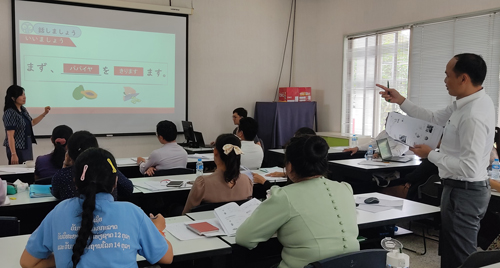
A Japanese-Language Specialist dispatched to the Research Institute for Educational Sciences, Ministry of Education and Sports, Laos, conducting summer intensive training for Laotian secondary school teachers (Laos)
The Japan Foundation dispatched Japanese-Language Specialists, Japanese-Language Assistants, and young Japanese-Language Instructors (J-LEAP) to the offices of the Japan Foundation, Ministries of Education, and educational institutions such as universities overseas (38 countries, 126 posts) to provide Japanese courses, train local Japanese-language teachers, give advice on preparing teaching materials and Japanese-language teaching methods, support the formation of networks among teachers, and visit educational institutions.
With the post-COVID return of in-person teacher training and events, Japanese-language education sites worldwide have regained their vitality.
Support for Japanese-Language Education Institutions
The Japan Foundation provided support programs for the promotion of Japanese-language activities such as the management of Japanese-language courses, the purchase and production of teaching materials, speech contests, Japanese-language education seminars and symposia carried out by the JF Nihongo Network (“Sakura Network”) members and Japanese-language educational institutions around the world.
- *Sakura Network Members are core Japanese-language educational institutions/organizations located in each country. As of March 31, 2024, the membership included 355 institutions in 101 countries/regions.
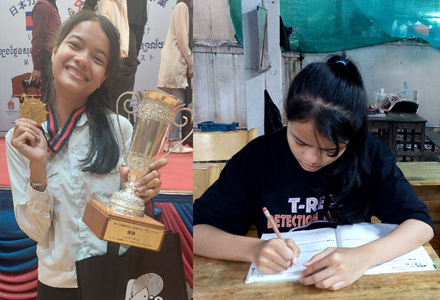
Contributing to learners’ Japanese-language proficiency improvement, such as this high school student who studied using purchased materials and won a speech contest, opening the door to study in Japan (Cambodia)
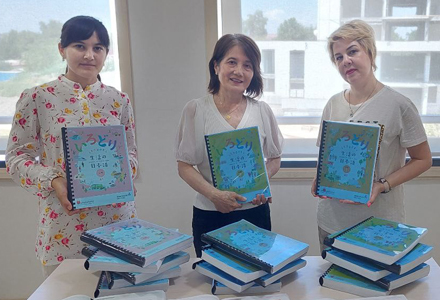
Printed and bound textbooks of the digital version of Irodori: Japanese for Life in Japan used in newly established Japanese-language classes (Uzbekistan)
Training for Overseas Japanese-Language Teachers
The Japan Foundation conducted Japanese-language teacher training at the Japanese-Language Institute, Urawa, and its overseas offices to develop and enhance the skills of those responsible for teaching Japanese abroad. At the Japanese-Language Institute, Urawa, we invited Japanese-language teachers from countries and regions worldwide to Japan, providing opportunities to study the Japanese language, teaching methods, and culture. We also launched a new online self-study course on teaching methods for Japanese teachers using the Japanese-language learning platform Minato.
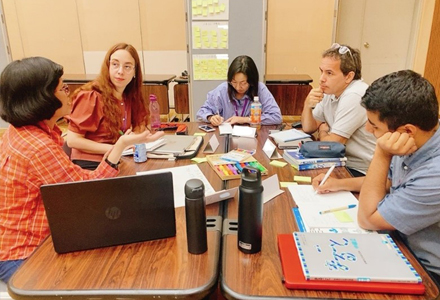
Comprehensive Japanese Teaching Methods Program (Summer)
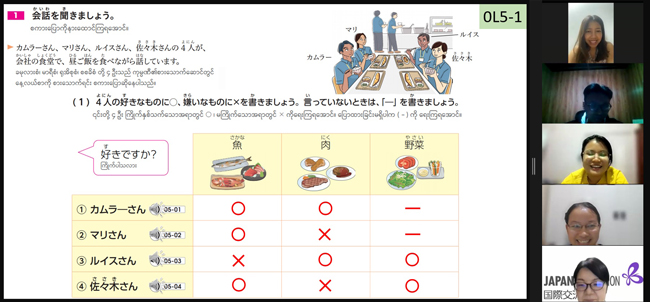
“Training Program for Teachers of the Japanese Language 6th Online Weekday Evening Course,” the first such course held at the Japan Foundation, Yangon, after the resumption of Japanese-language specialist dispatch to Myanmar
Providing Learning Opportunities for Students Overseas
The Japan Foundation invited foreign service officers, public officials, and specialists from various countries to train practical Japanese-language skills for their jobs and research, in addition to implementing training programs in Japan for Japanese-language learners from overseas. The aims were not only to enhance Japanese-language proficiency but also to deepen participants’ comprehensive understanding of Japan through exchanges with partner institutions and various cultural experiences.
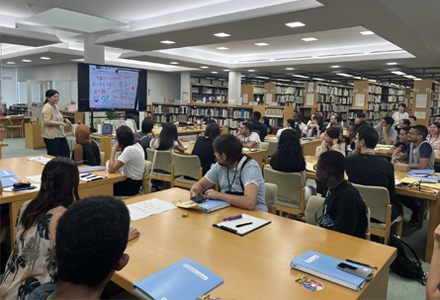
Outstanding students from various countries attending a class at the Japan Foundation Japanese-Language Institute, Kansai Library
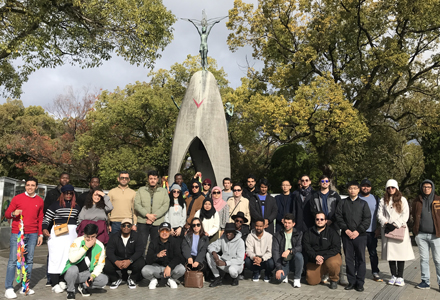
Foreign service officers and public officials participating in training visit the Hiroshima Peace Memorial Park
Japanese-Language Education for Japanese Children Resident Overseas and for the Descendants of Migrants
At the Japanese-Language Institute, Urawa, we invited Japanese-language educators from various countries and regions to participate in the Educators Meeting for Teaching the Japanese Language to Children Connected to Japan 2023. Participants shared relevant information about the current state and challenges of the Japanese-language education in their respective countries and regions and discussed necessary future initiatives. Additionally, Institute’s Executive Director SATO Gunei delivered a special lecture and workshop and participated in a panel discussion at the International Conference of the Network for Translingual Japanese (ICNTJ), co-organized with the Japan Foundation, Sydney.
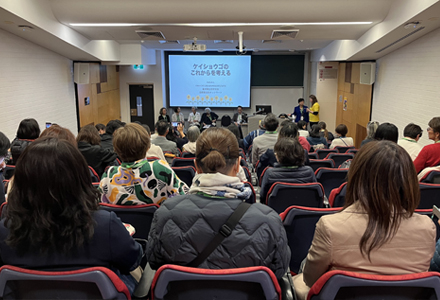
Panel discussion “Thinking About the Future of KEISHOGO” at the International Conference of the
Network for Translingual Japanese (Sydney, Australia)
The Japan Foundation, Lima Opening Commemoration
To commemorate the opening of the Japan Foundation, Lima, and the 150th anniversary of Japan–Peru diplomatic relations, the Japan Foundation, in collaboration with the University of Tsukuba and the Peruvian Japanese Association, held a Japanese-language symposium and teacher training program. We invited 27 Japanese language teachers from eight Spanish-speaking South American countries, including Peru, providing an opportunity to build Japanese language education networks in South America.
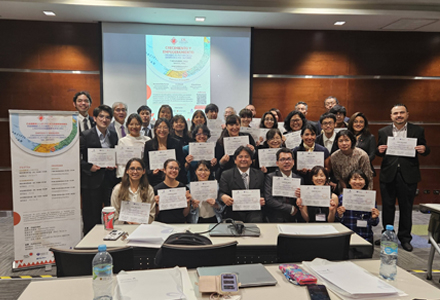
Certificate presentation at the closing ceremony of the Japanese-language teacher training program
- About Us Top
- About the Japan Foundation
- Donations
- News & Topics
- News & Topics Top
- Main Activities
- Main Activities Top
- Fiscal Year 2025-2026
- Fiscal Year 2024-2025
- Fiscal Year 2023-2024
- Fiscal Year 2022-2023
- Fiscal Year 2021-2022
- Fiscal Year 2020-2021
- Fiscal Year 2019-2020
- Fiscal Year 2018-2019
- Fiscal Year 2017-2018
- Fiscal Year 2016-2017
- Fiscal Year 2015-2016
- Fiscal Year 2014-2015
- Fiscal Year 2013-2014
- Events / Projects
- Press Release
- Press Release Top
- Fiscal Year 2025-2026
- Fiscal Year 2024-2025
- Fiscal Year 2023-2024
- Fiscal Year 2022-2023
- Fiscal Year 2021-2022
- Fiscal Year 2020-2021
- Fiscal Year 2019-2020
- Fiscal Year 2018-2019
- Fiscal Year 2017-2018
- Fiscal Year 2016-2017
- Fiscal Year 2015-2016
- Fiscal Year 2014-2015
- Fiscal Year 2013-2014
- Links
